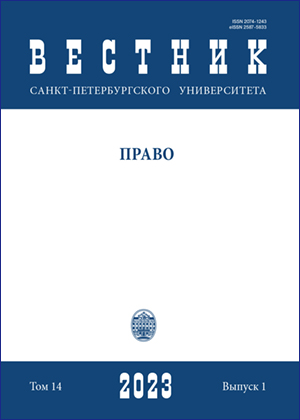Evolution of the concept of genocide through the lens of modern “memory wars”: International legal and intrastate dimensions
DOI:
https://doi.org/10.21638/spbu14.2023.115Abstract
The article examines how the concept of genocide has evolved at the international and national legal levels, beginning with its origins at the doctrinal level and culminating in international conventions and national regulatory acts. Challenges regarding the definition of genocide and ambiguous interpretation of genocide in relation to crimes against humanity were identified. It is demonstrated that international justice bodies interpret the concept of genocide differently. The study concluded that humanity did not fully utilize the potential of the United Nations and International Criminal Tribunals in order to develop a joint measured approach to assessing historical events, specifically World War II and the genocide in 1939–1945, in the context of actualizing history and triggering memory wars. The positions of states to consolidate the crime of genocide in criminal legislation are considered: compliance with the definition of genocide in international conventions, extension of the list of groups against whose members the genocide can be committed, leaving the list open as to which groups can be included. The preferences of the second option are shown. Examples of states turning to the facts of genocide committed in the past are given (for instance, Armenia towards Turkey, Namibia towards Germany, Poland towards Germany and Russia, Russia towards Germany and its allies during World War II), and it has been suggested that the material responsibility of states cannot be applied to events before 1945, since the desire to avoid it leads to non-recognition of political international-legal responsibility.
Keywords:
genocide, international crime, official remembrance policy, memory wars, self-identification of states, self-identification of peoples
Downloads
References
Downloads
Published
How to Cite
Issue
Section
License
Articles of "Vestnik of Saint Petersburg University. Law" are open access distributed under the terms of the License Agreement with Saint Petersburg State University, which permits to the authors unrestricted distribution and self-archiving free of charge.






